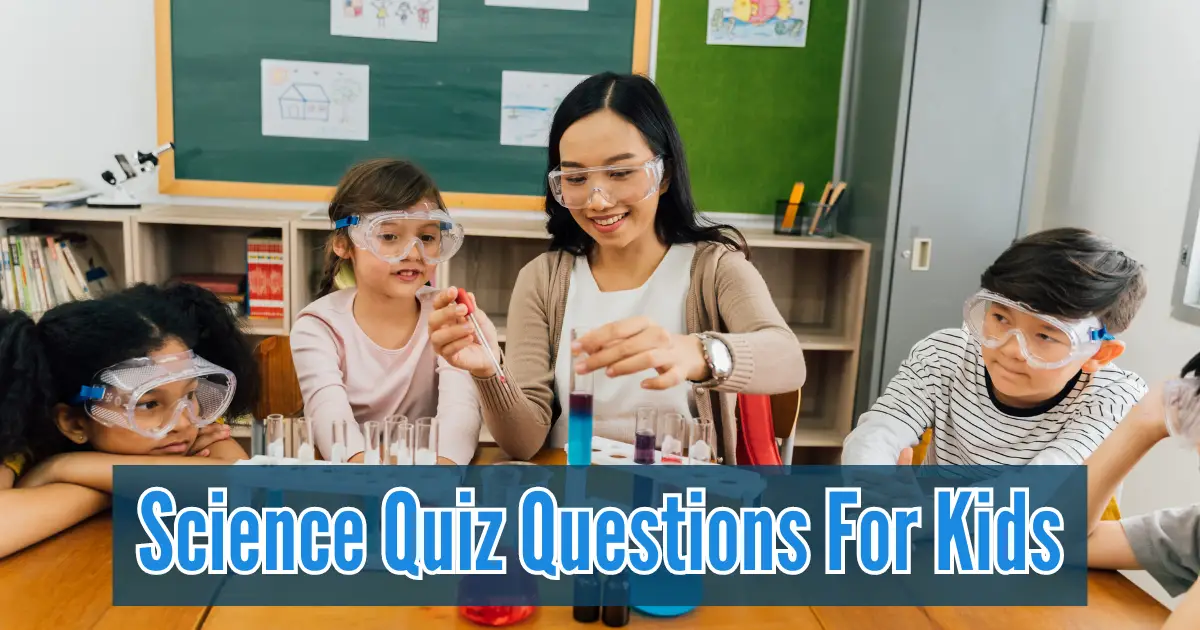75 Fun And Easy Science Quiz Questions For Kids
No quiz would be complete without a science and nature round! If you’re teaching kids, then it’s important to ensure the science questions in your quiz are not too difficult, otherwise the students will quickly lose interest. Below, you’ll find 75 fun and easy Science Quiz Questions For Kids. All the quiz questions have answers, so if you’re making your own science quiz, we’ve got you covered!
Science Quiz Questions For Kids
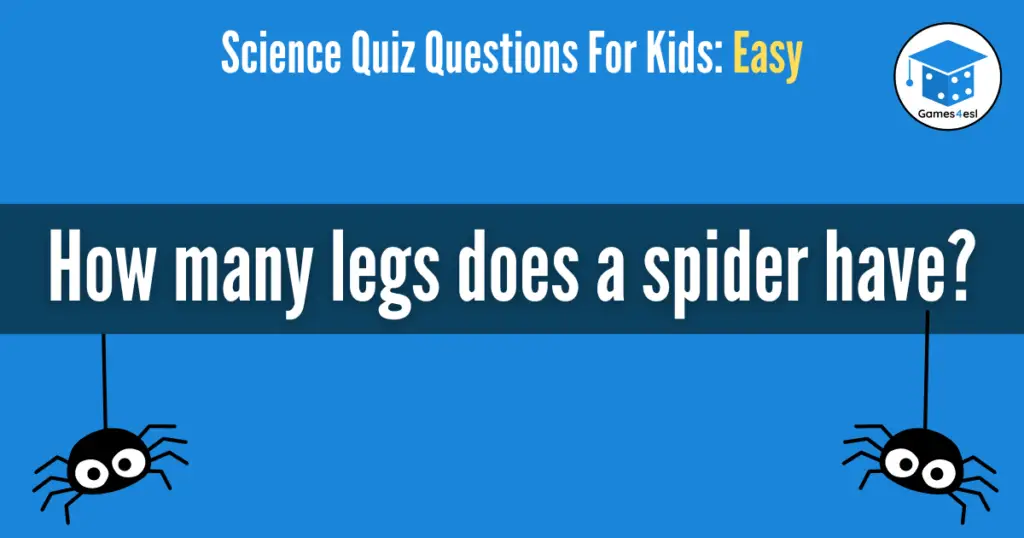
- Question: What planet is known as the Red Planet?
Answer: Mars - Question: How many legs does a spider have?
Answer: Eight - Question: What is the boiling point of water?
Answer: 100°C (212°F) - Question: What gas do plants produce during photosynthesis?
Answer: Oxygen - Question: How many bones are in the human body?
Answer: 206 - Question: What is the chemical symbol for water?
Answer: H₂O - Question: Which planet is closest to the sun?
Answer: Mercury - Question: What is the largest planet in our solar system?
Answer: Jupiter - Question: What is the main gas found in the air we breathe?
Answer: Nitrogen - Question: What is the process by which plants make their own food?
Answer: Photosynthesis - Question: How many teeth does an adult human have?
Answer: 32 - Question: What part of the plant conducts photosynthesis?
Answer: Leaves - Question: What is the hardest natural substance on Earth?
Answer: Diamond - Question: What is the center of an atom called?
Answer: Nucleus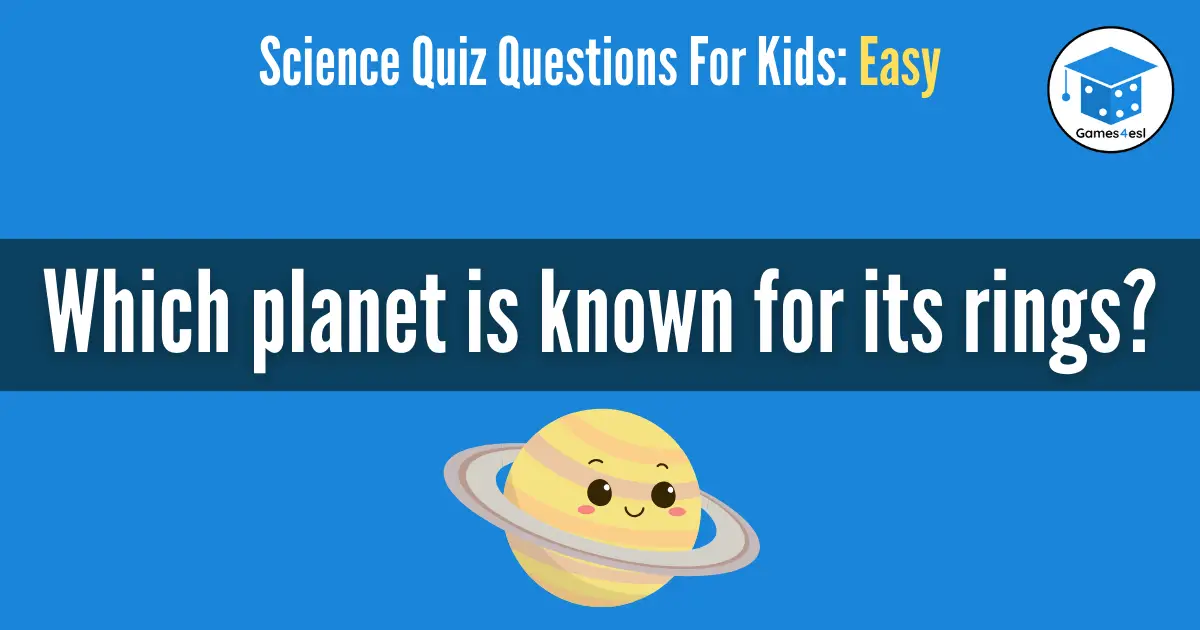
- Question: Which planet is known for its rings?
Answer: Saturn - Question: What force keeps us on the ground?
Answer: Gravity - Question: What is the most abundant element in the universe?
Answer: Hydrogen - Question: What is the smallest unit of life?
Answer: Cell - Question: How many planets are in our solar system?
Answer: Eight - Question: What is the main ingredient in the air we breathe?
Answer: Nitrogen - Question: What is a baby frog called?
Answer: Tadpole - Question: What do bees collect from flowers?
Answer: Nectar - Question: What is the largest mammal in the world?
Answer: Blue whale - Question: What part of the human body is made up of the most bones?
Answer: Hands - Question: What is the term for animals that only eat plants?
Answer: Herbivores - Question: What is the name of the galaxy we live in?
Answer: Milky Way - Question: How many hearts does an octopus have?
Answer: Three - Question: What do you call a scientist who studies rocks?
Answer: Geologist - Question: What is the speed of light?
Answer: Approximately 300,000 km/s (186,000 miles/s)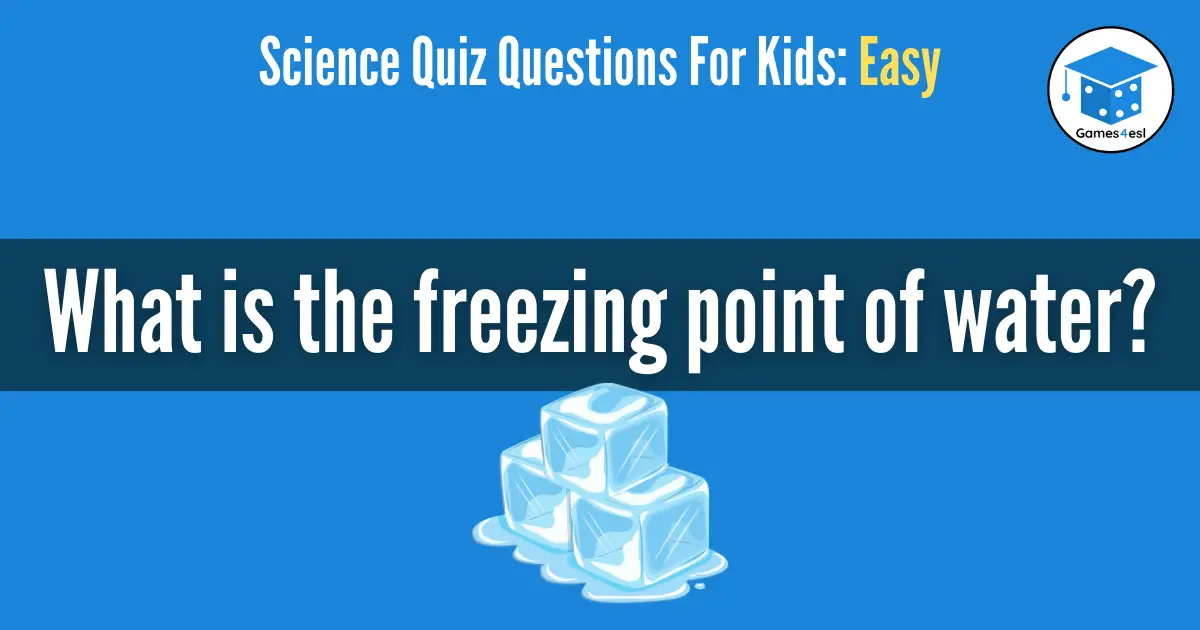
- Question: What is the freezing point of water?
Answer: 0°C (32°F) - Question: Which organ in the human body pumps blood?
Answer: Heart - Question: What type of animal is a Komodo dragon?
Answer: Reptile - Question: What is the largest organ in the human body?
Answer: Skin - Question: What is the chemical formula for carbon dioxide?
Answer: CO₂ - Question: Which planet is known as the Blue Planet?
Answer: Earth - Question: How many chambers does the human heart have?
Answer: Four - Question: What is the main source of energy for the Earth?
Answer: The Sun - Question: What kind of energy does a moving object have?
Answer: Kinetic energy - Question: What is the study of the weather called?
Answer: Meteorology - Question: What planet is known as the Morning Star?
Answer: Venus - Question: How many moons does Earth have?
Answer: One - Question: What is the name of the first man to walk on the moon?
Answer: Neil Armstrong - Question: What is the natural satellite of Earth?
Answer: The Moon - Question: Which metal is the best conductor of electricity?
Answer: Silver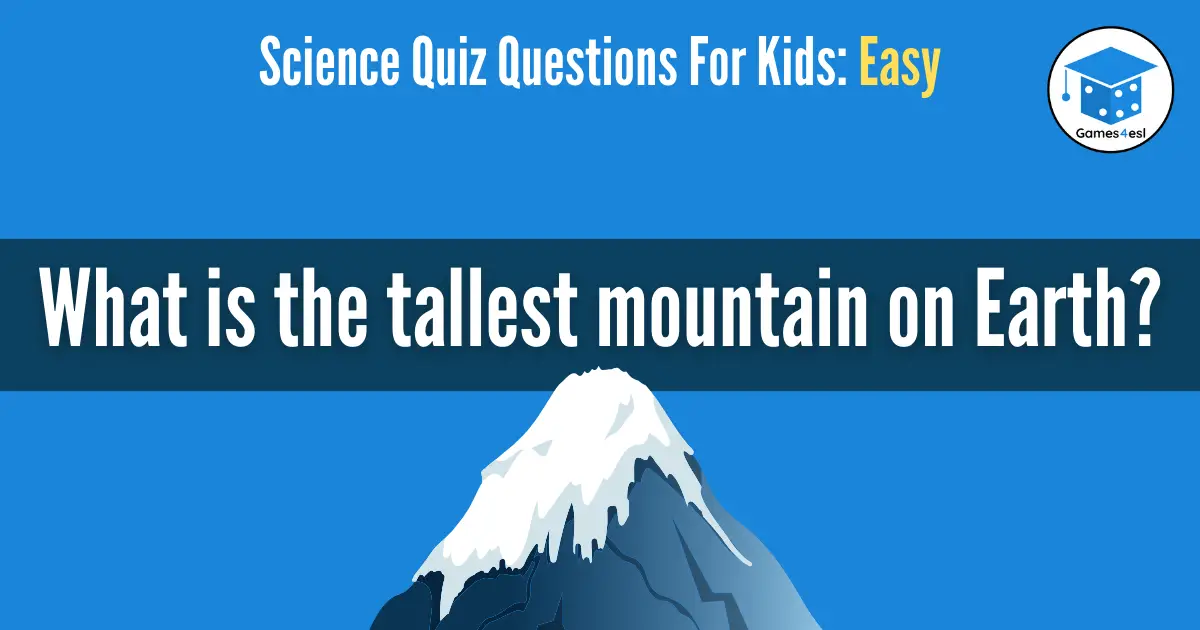
- Question: What is the tallest mountain on Earth?
Answer: Mount Everest - Question: What is a group of stars that form a pattern called?
Answer: Constellation - Question: What part of the cell contains DNA?
Answer: Nucleus - Question: What is the hottest planet in our solar system?
Answer: Venus - Question: What is the process of liquid water turning into vapor called?
Answer: Evaporation - Question: What is a scientist who studies fossils called?
Answer: Paleontologist - Question: What is the smallest planet in our solar system?
Answer: Mercury - Question: How many layers does the Earth have?
Answer: Four (Crust, Mantle, Outer Core, Inner Core) - Question: What is the main function of red blood cells?
Answer: To carry oxygen - Question: What kind of animal lays eggs and has feathers?
Answer: Birds - Question: What is the energy from the sun called?
Answer: Solar energy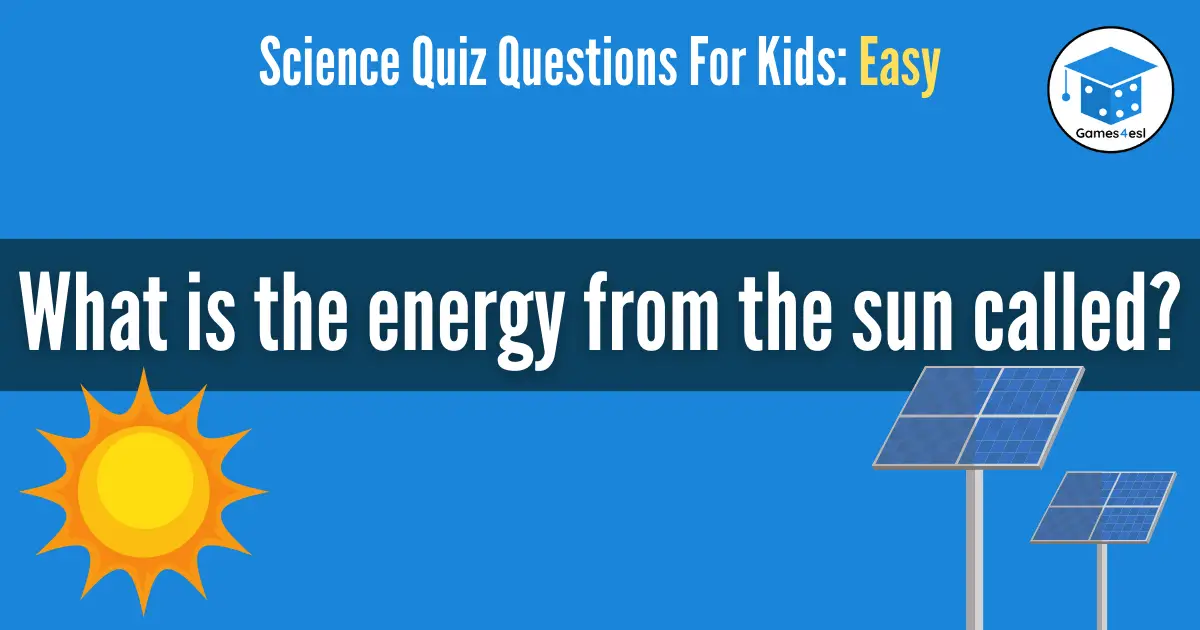
- Question: What do you call molten rock before it has erupted?
Answer: Magma - Question: What is the main gas in the Earth’s atmosphere?
Answer: Nitrogen - Question: What is the heaviest naturally occurring element?
Answer: Uranium - Question: What do you call the bones that make up the spine?
Answer: Vertebrae - Question: What is the largest type of tree by volume?
Answer: Giant Sequoia - Question: What is the distance around a circle called?
Answer: Circumference - Question: What kind of energy is stored in a stretched rubber band?
Answer: Elastic potential energy - Question: What is the common name for dried plums?
Answer: Prunes - Question: What is the name of the process by which plants lose water vapor?
Answer: Transpiration - Question: What type of energy do plants use to make food?
Answer: Light energy - Question: What is the name of the planet known for its large red spot?
Answer: Jupiter - Question: What is the study of living organisms called?
Answer: Biology - Question: What are the building blocks of proteins?
Answer: Amino acids - Question: What type of rock is formed from volcanic activity?
Answer: Igneous rock - Question: What is the common name for the aurora borealis?
Answer: Northern Lights - Question: What is the smallest bird in the world?
Answer: Bee Hummingbird - Question: What is the primary gas that plants take in during photosynthesis?
Answer: Carbon dioxide - Question: What is the main cause of ocean tides?
Answer: The Moon’s gravitational pull - Question: What type of galaxy is the Milky Way?
Answer: Spiral galaxy - Question: What is the main organ of the respiratory system?
Answer: Lungs
Benefits Of Using Quizzes To Review Science Lessons
Not only are quizzes super fun, but they also offer numerous benefits for reviewing science lessons, enhancing a child’s learning experience. These benefits include:
- Active Engagement: Quizzes actively involve students in the learning process. Instead of passively reading or listening, they must recall and apply knowledge, which aids in better retention and understanding.
- Immediate Feedback: Quizzes provide immediate feedback, helping both teachers and students identify areas that need more attention. This timely feedback is crucial for effective learning and allows for quick corrections.
- Boosts Memory Retention: Regular quizzing reinforces memory retention. The act of recalling information helps to strengthen neural connections, making it easier for students to remember facts and concepts in the long term.
- Promotes Critical Thinking: Well-designed science quiz questions can encourage critical thinking and problem-solving skills. They require students to analyze information, make connections, and apply their knowledge in new ways.
- Motivates Learning: Quizzes can be a fun and competitive way to motivate students. They often feel a sense of accomplishment when they get answers right, which can boost their confidence and encourage a positive attitude toward learning.
- Identifies Learning Gaps: Quizzes help teachers and parents identify specific learning gaps. By pinpointing which questions students struggle with, educators can tailor their instruction to address those weaknesses.
- Encourages Regular Review: The use of quizzes encourages regular review of material, which is essential for mastery. This ongoing review helps to prevent the last-minute cramming and fosters a deeper understanding of the subject matter.
Incorporating quizzes into science lessons not only makes learning more interactive and enjoyable but also significantly enhances educational outcomes. They serve as an effective tool to ensure that students are actively engaging with the material and are well-prepared for future academic challenges.
More Quiz Questions
We have lots more fun quiz questions here on Games4esl.
Check them out before you go!
75 Easy History Quiz Questions For Kids
150 Easy Trivia Questions And Answers
Jeopardy Questions And Answers
Family Feud Questions
Would You Rather Questions For Kids

